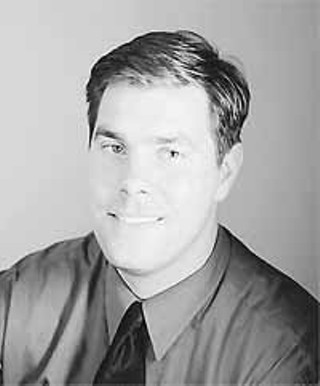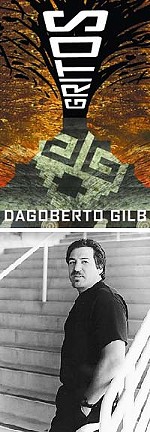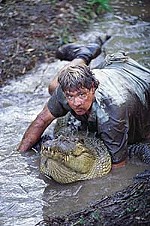On the Move
Michael O'Donnell's Plan to Make Salon.com a Part of Your Life
By David Garza, Fri., March 3, 2000

If Michael O'Donnell gets his way, he'll be with you all day and all night. He'll sit in your car when you drive to work in the morning, he'll join you for dinner, and he'll even put you to bed when the long day has ended. And believe it or not, you're going to ask him -- if not beg him -- for more. That's his lofty goal, anyway, as president and CEO of Salon.com (http://www.salon.com), arguably the most successful and respected of the so-called news and culture "webzines." Through new alliances with traditional media, O'Donnell is poised to transform this five-year-old venture from an intelligent Web site into a full-fledged, ubiquitous media brand. Not only does he plan to debut a television version of Salon's online content on the Bravo network in the fall, he's also developing book deals, radio shows, and streaming and wireless operations: All Salon, all the time. O'Donnell will discuss this convergence between new and traditional media when he makes a feature presentation at this year's SXSW Interactive Festival on Tuesday, March 14. Though he hopes to forge new partnerships and find potential investors during his visit, his real goal is simply to increase public awareness of Salon. Though the Web site is well-known in media circles, he admits that by Salon's own estimates, only 13% of the Web site's target audience has ever even heard of it. When I spoke to him recently, he was away from Salon's base in San Francisco and meeting with television executives in Los Angeles, working hard on those plans to bring himself into your home:
Austin Chronicle: How are traditional media reacting to this sort of growth by sites like Salon? Is there any suspicion that you sense?
Michael O'Donnell: I think it's a mixture of respect and envy, or jealousy. The New York Times just came out with a big feature on us last weekend. It was flattering on one hand, but they had to say: Well, they only have so much cash left, or can they really survive? What happened initially is that we were this media darling -- we came out of nowhere to build this online magazine, and now we're becoming much more of a force. We went public this year, we've raised a lot of money, we've signed a number of strong partnerships and now they're saying, "Geez, Salon could be around for the next 10 or 20 years." And that's interesting, but it concerns some companies because we're more of a threat. CNN refused our television ads, for example, because they saw us as competition, which I thought was a great validation of where our business is.
AC: And who do you consider your competition to be? Is it traditional print publications? Or is it other online sources?
MO: In some ways we feel like we don't have direct competition because no one's really doing what we're doing -- really more of an upscale, horizontal approach. I think CNN has more resources, maybe, in news, but we're doing a pretty good job of breaking news stories. We have, probably, better technology coverage than they do in some respects. I guess CNN would be a competitor, MSNBC, ABC.com. Our competition used to be Slate, I think, initially, but now we've continued to grow beyond that, so I think it's closer to the news networks or some of the other portfolios or portals.
AC: Are there any models in particular that Salon looks to in its growth?
MO: Maybe someone like News Corp that fills a global brand. They've got compelling content, they've got television content, they've got print, they have HarperCollins in book publishing, they have newspapers, they have television. And they're global, and I think that's a very powerful company. They're also very successful -- they make a lot of money. They have a lot of shareholder value. And they're constantly innovating and trying new things, so I think they're clearly a role model. And Time Warner. So those are two big role models, but I think Time Warner has created kind of a diversified media company, but they've done it with the utmost of quality. It's hard to dispute what Warner Bros. puts out every year or what Time puts out every year in the magazine division. And again, they're very successful, very profitable. So between News Corp and Time Warner, I think there's a lot of successful business models that we can look at.
AC: Has it always been that kind of model, though?
MO: I think initially we were more a webzine, maybe looking at the The New Yorker as an initial role model for us, so we've morphed and we've grown, and our ambitions have gotten even bigger. We said this to the analysts a few weeks ago. We said we've grown from a webzine to a media company, and I think we're looking and feeling much more like a diversified media company than just a Web magazine.
AC: In the earlier years, how were you able to attract the talent to your Web site, someone like Camille Paglia, for example? And how did Salon then grow into what it has become?
MO: I think we've always believed it was a talent business, and the talent was the most important [thing], whether it be the writers, the editors, the columnists, or staff. And the early founders -- David Talbot, the founder and chairman of Salon who's very active in leading the company -- he had a track record [as former features editor at the San Francisco Examiner], as well as relationships with some of the best writers and editors around. And so he brought those relationships with him to Salon. And then we just brought in and we discovered new talent, just constantly looking for the hot young writers, as well as people contacting us who want to come work for us. So that's been a great source of recruiting. It's a very competitive market, as you know. Especially for writers, but I think we've got the buzz that people are looking for. I think that's also really important for writers, too. I think they're saying, "All right, what are the hot companies to work for?" And we're now attracting writers, editors, producers from some of the most well-known media outlets. But initially we started off with a pretty significant Rolodex from David Talbot and the people that he brought on who had relationships in traditional media, and people felt comfortable and confident that they would do a good job.
AC: As Salon grows into other fields of traditional media, how do you attempt to keep the quality and focus of your content?
MO: One of our largest investors -- I won't name him -- when we met with him recently, the only thing he asked of us was just to maintain the quality. And we also feel that that's our bread and butter. If the quality starts being diluted, then we lose our competitive advantage. So we're growing aggressively, but most of the growth now is on the business side versus the content side. We have a lot of content today, so it's not like we're growing our content in so many ways that we can't control it. Just the opposite; we continue to refine the content we have. We're adding a little bit more, but most of the growth will come in new distribution, new alliances, television development, radio development, things like that. So it's not like we're doubling our content or tripling our content. Content's growing but only slightly. The growth is going to be coming in new audiences and business relationships.
AC: And as you enter into new forms -- radio and television, for example -- how are you going to avoid this need for tripling the content?
MO: Well there's different ways we can do it. We can use a lot of the content from the Web site. Obviously, you have to reformat it for television, but a lot of those people who are doing it work for us, and there will be some additions, but even those additions are very carefully orchestrated. I think the most important thing any company has is its brand, and we have a brand to protect. So even in the TV development the product will look and feel like Salon. And I'm down here in L.A. meeting with television executives right now who are helping us. So in that case, one of our board members is Norman Lear, arguably the best Hollywood producer of all time. We have a lot of people around the company who are helping us.
AC: Okay. What role does somebody in your position -- president, CEO -- play in developing the conceptual part?
MO: I maybe give a little bit of input in terms of the commercial potential, but I really leave the creative development to David Talbot and his team. They have an incredible reputation, and they've executed in so many ways. So I give input, but it's really hands-off. Because I think we've got, arguably, the best content operation on the Web.
AC: In terms of the Web site, why do you think daily content, daily updates, are crucial in new media?
MO: I think the pace of information that people are looking for -- how they use their e-mail, just the pace of life, I think -- speaks to needs for more and more updated information. You have 24-hour cable, you have 24-hour radio, so I think if you're not updating your content more frequently, you become outdated. Think of the news magazines like Time and Newsweek. Last year during the presidential impeachment trial, they were outdated by the time they published. Information was changing so quickly. I think Time ran four or eight midweek issues for the first time ever because they couldn't wait for their weekly cycle. So I think the media cycle had changed. I think some of the monthly magazines that have debuted recently are having some real trouble with that. We just recognized that three years ago and decided to go daily. It was a tough decision, it was an expensive decision, but it's really paid off. Now we're updating throughout the day. Especially as new mobile devices start to emerge. Like the Palm Pilot. You can update your Palm Pilot; every time you use your Palm Pilot device, you're going to get the latest Salon.com content. And going forward on your cell phone -- we're going to be streaming our content onto your cell phone. And people are going to want the latest information, whether it be a news story or the latest movie review or what book to buy, they're going to be looking for Salon's point of view, and it's gotta be updated.
AC: What do you think the difference is between Salon branching out from its online base into radio and television, and organizations coming in the opposite direction and stepping into the Web from more traditional media? How do you view those differences?
MO: Sometimes it's hard with your existing franchise to come to the Web. Because there's a debate often about "which story do we break first -- the one online, or the one in our newspaper?" And newspaper divisions are frustrated, or they're territorial, and there's all sorts of debates going on within these companies, but I think that's our advantage. You've seen that happen over the last few years. Media companies have been developing online businesses for the last five years. And they've gone through tons of money, but they haven't been as aggressive or they haven't developed from the Web point of view. They've often just tried to come from the traditional, and in some ways just do a direct port from their magazine business or their newspaper business to the Web. And I think that the Web calls for something more unique. I think it's a different medium. Very much like how Amazon became the dominant bookseller. The other brands had an existing business that they didn't want to jeopardize, they maybe initially were a little more timid online. Same with Yahoo. I think Yahoo has become one of the dominant media companies online now because they weren't preoccupied with their "traditional" business or concerned about cannibalizing sales or business. I think that's an advantage that we have. Now there's also an advantage to having a parent brand, no question. But sometimes that can be counterbalanced by not being inhibited and being very aggressive.
AC: And what about Salon initially attracted you away from your previous work in gaming?
MO: Well, first it was a new medium, and the Internet was just beginning to take off three years ago. I saw that as a great opportunity to be a part of something. It was really revolutionizing business. Secondly, I was just attracted to the people, the founders. I mentioned David, the group of people that he had assembled. And it was a small group -- maybe 10 or 11 people then, but incredibly talented with huge ambition and wanting to have a lot of fun. So I think that combination made it a fairly easy decision to come on board.
AC: One of the last things I want to talk about, because it's of particular interest to a city like Austin, is the article that was in Salon on October 28 by Paulina Borsook, in which she claims that the Internet destroyed San Francisco, basically. Really interesting article -- some of the phrases just pulled from the story are really provocative in themselves: "the bitter class struggle," "key those SUVs," and so forth. There's a lot of that sentiment here, as well, I suspect. From your perspective, how legitimate are these claims, when someone like Borsook is saying that it's the end of the artistic and ethnic and homosexual communities in San Francisco?
MO: I think there's some truth to that. San Francisco has become ground zero for the Internet. It was often a second city to L.A. here on the West Coast and never really thought of as a financial powerhouse or a center of commerce. But I think the Internet has just created so much industry and so much opportunity in San Francisco, and with that comes growth and expansion and real estate development and prices escalating. But I think that's also created new opportunities, too. I think there's no shortage of employment, there's no shortage of vision in San Francisco. Restaurants stay open later, bars stay open later. It's easier to get a flight into San Francisco. So there are some benefits. And I think San Francisco will always have a unique feel to it. And while it has gotten expensive, much like New York, or Hong Kong, I guess, there's always pockets. But I think that's been countered by wages going up, too.
AC: It's interesting you bring up the employment rate. Just how open do you think the doors are to the supposed "riches" of the Internet to some of these groups that are being driven out?
MO: I think the Internet is probably the most open community in terms of employment. It's not so much what color is your skin or what your sexual orientation is. It's "How smart are you?" and "How ambitious are you?" So if you have the ambition and the brains, or want to learn and want to work hard, you'll find a job. It's not what family you grew up in or even what school you went to. We're finding some of our most talented employees maybe started off in junior college and taught themselves HTML on the side while they were waiting tables. And next thing you know they're the star art director. So I think that's what the Web is doing. It's creating these new professional ranks. And while it helps to have an MBA, it's not necessary. It's "Can you design a nice Web page?" "Are you a deal maker?" That's what it's about. ![]()








